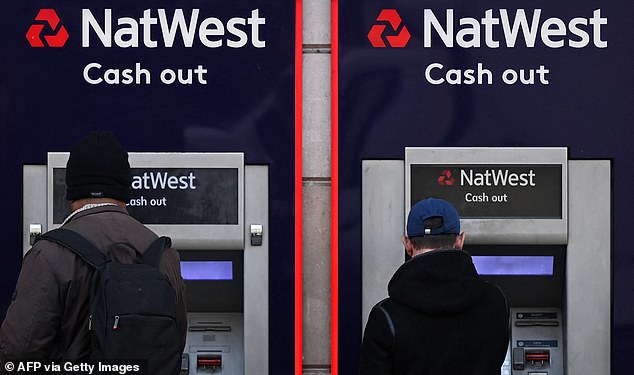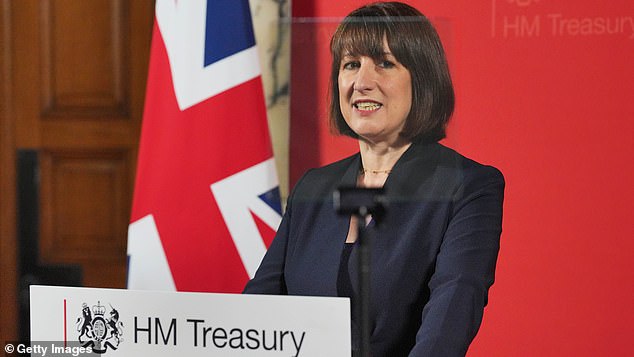Table of Contents
Critics have criticised Labour for calling off the NatWest share sale.
They argued that it was a unique opportunity to encourage the public to buy shares.
It has been described as a missed opportunity to encourage the public to develop investment habits and revitalise the London market.
This week, Chancellor Rachel Reeves confirmed that there will be no NatWest action titled “Tell Sid” for the public because it would cost the taxpayer too much.
Instead, it will offer the government’s £5.6bn stake to pension funds, insurers and asset managers.
Under fire: Chancellor Rachel Reeves confirmed there will be no NatWest ‘Tell Sid’ stock for the public
Former Chancellor of the Exchequer Jeremy Hunt said: “A public sale of shares would have widened share ownership and boosted the London stock market – nothing, in short, against the belief in spreading wealth and prosperity.”
Former cabinet minister Jacob Rees-Mogg added: “This is a reminder that Labour is an anti-capitalist party that does not want to see the expansion of wealth or support London’s capital markets.”
A retail share offering would involve offering discounts worth hundreds of millions of pounds to the public. Reeves said on Monday: “It would therefore not represent value for money and will not go ahead.”
According to estimates published by the Treasury this week, cancelling the sale would save between £100m and £450m. The lender had been bailed out by the government during the 2008 financial crisis, the last time Labour was in power.
At its peak, taxpayer ownership was 84 percent. Critics argue that since taxpayers have held the bank in their hands for so long, it is only fair that they be offered a discounted chance to own portions of it.
Mark Northway of non-profit investment group ShareSoc said he was “very disappointed” by this “missed opportunity”.
‘Shareholders, including private individuals, suffered the consequences of the government bailout. Private taxpayers have financed the recovery over the past decade and a half.
‘There was an opportunity here to allow individual investors to participate in the next chapter on the same level as institutional investors, but the new government has decided to favour the financial services industry.’
And the group believes the sale could have been used by schools to teach lessons about responsible finance.
Danni Hewson, head of financial research at broker AJ Bell, said: ‘While protecting the taxpayer is understandable and even laudable, the share sale could have been used as a valuable catalyst to attract first-time investors.

According to estimates published by the Treasury this week, cancelling the sale of Natwest would result in savings of between £100m and £450m.
It would have been exciting to create a moment that could have changed the investment landscape for the better.
This month, the government’s share fell below 20 percent.
The Conservatives have planned a sale this summer, with former chancellor Jeremy Hunt preparing advertising agency M&C Saatchi to launch an advertising campaign called ‘Tell Sid’, the slogan used to encourage the public to buy British Gas shares in 1986.
But NatWest said last week it had to spend £24m on a campaign, which never saw the light of day.
In the planned announcement, presenter Sir Trevor McDonald asked the public in a television campaign aimed at boosting the beleaguered stock market: “Are you in?”
A NatWest spokesman said: “Any decision on the sale of government shares is a matter for the Treasury.
‘We are pleased with the continued reduction in the government’s share, which has almost halved this year and is now below 20 percent.
“We welcome the Chancellor of the Exchequer’s commitment to returning NatWest Group to private ownership. This is a shared ambition that we believe is in the best interests of both the bank and all of our shareholders.”
But Chris Beauchamp, chief market analyst at investment platform IG, said it was “inevitable” that Labour would call off the sale given Natwest’s soaring share price.
He added that “the trend is changing towards greater public ownership in the case of railways, and one could argue the same for other utilities as well. There is a feeling that things have not worked out.”
DIY INVESTMENT PLATFORMS

AJ Bell

AJ Bell
Easy investment and ready-to-use portfolios

Hargreaves Lansdown

Hargreaves Lansdown
Free investment ideas and fund trading

interactive investor

interactive investor
Flat rate investing from £4.99 per month

Saxo

Saxo
Get £200 back in trading commissions

Trade 212

Trade 212
Free treatment and no commissions per account
Affiliate links: If you purchase a product This is Money may earn a commission. These offers are chosen by our editorial team as we believe they are worth highlighting. This does not affect our editorial independence.


